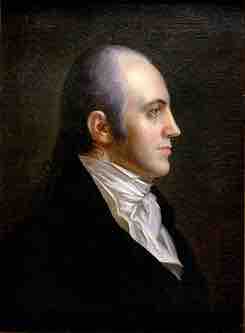Introduction
The Burr Conspiracy of 1807 was a suspected act of treason among planters, politicians, and army officers led by former U.S. Vice President Aaron Burr. According to the accusations against him, Burr's goal was to create an independent nation in the center of North America and/or in the American Southwest and parts of Mexico. Burr's defense was that he wanted to take possession of and farm 40,000 acres in the Texas Territory leased to him by the Spanish. When the expected war with Spain broke out, he would fight with his armed "farmers" to seize and conquer land.
U.S. President Thomas Jefferson and others had Burr arrested and indicted for treason despite having no firm evidence. Burr's true intentions are still unclear to historians. Burr was acquitted of treason, but the trial destroyed his already faltering political career.

Aaron Burr
Third vice president of the United States under Thomas Jefferson.
Contacts with the British
In 1804, while Burr was still vice president, he met with Anthony Merry, the British minister to the United States. As Burr told several of his colleagues, he suggested to Merry that the British might regain power in the Southwest if they contributed guns and money to his expedition. Burr offered to detach Louisiana from the Union in exchange for a half a million dollars and a British fleet in the Gulf of Mexico. However, this never came to fruition, and Merry was recalled to Britain on June 1, 1806.
Travels in Louisiana
In 1805, Burr conceived plans to emigrate out of the United States, which he claimed was for the purpose of taking possession of land in the Texas Territory leased to him by the Spanish. He traveled throughout Louisiana that year, and in the spring, Burr met with Harman Blennerhassett, who provided access to an island he owned on the Ohio River. Burr and his co-conspirators used this island as a space for gathering men and supplies, and Burr tried to recruit volunteers to enter Spanish territories. Reports of Burr's plans first appeared in newspaper reports in August of 1805, suggesting that Burr intended to raise a western army and "to form a separate government."
Burr returned to the West later in 1806 to recruit more volunteers for a military expedition down the Mississippi River. He continued to gather men and supplies on Blennerhasset's island in the Ohio River. The Governor of Ohio grew suspicious of the activity there and ordered the state militia to raid the island and seize all supplies. Blennerhasset escaped with one boat and met up with Burr at the operation's headquarters on the Cumberland River. With a significantly smaller force, the two headed down the Ohio to the Mississippi River and New Orleans. Commanding General of the Army James Wilkinson had vowed to supply troops to Burr at New Orleans; however, he had concluded that the conspiracy was bound to fail, and rather than providing troops, Wilkinson revealed Burr's plan to President Jefferson.
Arrest and Trial
Jefferson was warned several times of Burr's possible conspiratorial activities by Joseph Hamilton Davies, the federal District Attorney for Kentucky. However, it was not until mid-1806 when Jefferson and his cabinet began to take more notice of reports of political instability in the West. Their suspicions of Burr were confirmed after Wilkinson's revelation. Convinced of Burr's guilt, Jefferson ordered his arrest.
Burr was charged with treason due to the alleged conspiracy and stood trial in Richmond, Virginia. He was acquitted due to lack of evidence, as Chief Justice Marshall did not consider conspiracy without actions sufficient for conviction. Burr—Revolutionary War hero, U.S. Senator, New York State attorney general and assemblyman, and finally, vice president under Jefferson—adamantly denied all charges against his honor, his character, and his patriotism.
Burr's trial brought into question the ideas of executive privilege, state secrets privilege, and the independence of the executive branch of government. Burr's lawyers, including John Wickham, asked Chief Justice John Marshall to subpoena Jefferson, claiming that they needed documents from Jefferson to accurately present their case. Jefferson proclaimed that as president, he reserved the right to decide, "what papers coming to him as President, the public interests permit to be communicated [and] to whom." He insisted that all relevant papers had been made available and that he was not subject to this writ because he held executive privilege. He also argued that he should not be subject to the commands of the judiciary because the Constitution guaranteed the executive branch's independence from the judicial branch. Chief Justice Marshall decided that the subpoena could be issued despite Jefferson's presidency. Though Marshall vowed to consider Jefferson's office and avoid "vexatious and unnecessary subpoenas," his ruling was significant because it suggested that, like all citizens, the president was subject to the law.